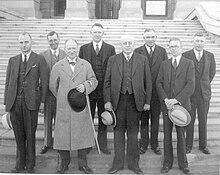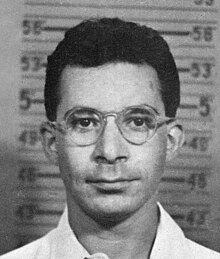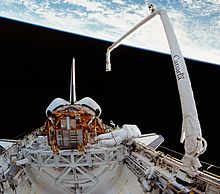Portal:Canada
| Showcase | Contents | Contributing |
Introduction
Canada is a country in North America. Its ten provinces and three territories extend from the Atlantic Ocean to the Pacific Ocean and northward into the Arctic Ocean, making it the world's second-largest country by total area, with the world's longest coastline. Its border with the United States is the world's longest international land border. The country is characterized by a wide range of both meteorologic and geological regions. With a population of just over 41 million people, it has widely varying population densities, with the majority residing in urban areas and large areas of the country being sparsely populated. Canada's capital is Ottawa and its three largest metropolitan areas are Toronto, Montreal, and Vancouver.
Canada is a parliamentary democracy and a constitutional monarchy in the Westminster tradition. The country's head of government is the prime minister, who holds office by virtue of their ability to command the confidence of the elected House of Commons and is appointed by the governor general, representing the monarch of Canada, the ceremonial head of state. The country is a Commonwealth realm and is officially bilingual (English and French) in the federal jurisdiction. It is very highly ranked in international measurements of government transparency, quality of life, economic competitiveness, innovation, education and human rights. It is one of the world's most ethnically diverse and multicultural nations, the product of large-scale immigration. Canada's long and complex relationship with the United States has had a significant impact on its history, economy, and culture.
A developed country, Canada has a high nominal per capita income globally and its advanced economy ranks among the largest in the world by nominal GDP, relying chiefly upon its abundant natural resources and well-developed international trade networks. Recognized as a middle power, Canada's strong support for multilateralism and internationalism has been closely related to its foreign relations policies of peacekeeping and aid for developing countries. Canada is part of multiple international organizations and forums. (Full article...)
Featured article -

The 1937 Social Credit backbenchers' revolt took place from March to June 1937 in the Canadian province of Alberta. It was a rebellion against Premier William Aberhart by a group of backbench (not part of the cabinet) members of the Legislative Assembly (MLAs) from his Social Credit League. The dissidents were unhappy with Aberhart's failure to provide Albertans with CA$25 monthly dividends through social credit as he had promised before his 1935 election. When the government's 1937 budget made no move to implement the dividends, many MLAs revolted openly and threatened to defeat the government in a confidence vote. (Full article...)
Featured biography -
Louis Alexander Slotin (/ˈsloʊtɪn/ SLOHT-in; 1 December 1910 – 30 May 1946) was a Canadian physicist and chemist who took part in the Manhattan Project. Born and raised in the North End of Winnipeg, Manitoba, Slotin earned both his Bachelor of Science and Master of Science degrees from the University of Manitoba, before obtaining his doctorate in physical chemistry at King's College London in 1936. Afterwards, he joined the University of Chicago as a research associate to help design a cyclotron. (Full article...)
Selected panorama -
National symbol -
Canadarm or Canadarm1 (officially Shuttle Remote Manipulator System or SRMS, also SSRMS) is a series of robotic arms that were used on the Space Shuttle orbiters to deploy, manoeuvre, and capture payloads. After the Space Shuttle Columbia disaster, the Canadarm was always paired with the Orbiter Boom Sensor System (OBSS), which was used to inspect the exterior of the shuttle for damage to the thermal protection system. (Full article...)
Selected vital article -
Canadian cuisine consists of the cooking traditions and practices of Canada, with regional variances around the country. First Nations and Inuit have practiced their culinary traditions in what is now Canada for at least 15,000 years. The advent of European explorers and settlers, first on the east coast and then throughout the wider territories of New France, British North America and Canada, saw the melding of foreign recipes, cooking techniques, and ingredients with indigenous flora and fauna. Modern Canadian cuisine has maintained this dedication to local ingredients and terroir, as exemplified in the naming of specific ingredients based on their locale, such as Malpeque oysters or Alberta beef. Accordingly, Canadian cuisine privileges the quality of ingredients and regionality, and may be broadly defined as a national tradition of "creole" culinary practices, based on the complex multicultural and geographically diverse nature of both historical and contemporary Canadian society. (Full article...)
Selected picture -
Current events
- January 21, 2025 –
- Much of Canada and the contiguous United States are impacted by a cold wave, killing one person near Milwaukee, Wisconsin. Historic snowfall is expected in the US South, and historic blizzard and whiteout conditions are expected on the Gulf Coast. (CNN)
- January 6, 2025 –
- Davivienda, of Colombia, and Scotiabank, of Canada, announced a merger where Davivienda absorbs Scotiabank operations in Colombia, Costa Rica and Panama, and, in turn, Scotiabank acquires 20% of the stakes in Davivienda. (Scotiabank)
- January 6, 2025 – Resignation of Justin Trudeau
- Canadian Prime Minister Justin Trudeau announces his resignation as leader of the Liberal Party and also announces that he will resign as Prime Minister once a new Liberal Party leader is chosen. (BBC News)
- January 1, 2025 – Foreign relations of Mexico
- Mexico's Tax Administration Service implements new tariffs, including a 19% duty on goods from countries without international trade agreements with Mexico and a 17% duty on goods from Canada and the United States under certain value thresholds. (Reuters)
- December 16, 2024 – Resignation of Chrystia Freeland
- Chrystia Freeland resigns as Canada's Deputy Prime Minister and Minister of Finance amid disagreements with Prime Minister Justin Trudeau on increased government spending and how to handle possible U.S. tariffs imposed by the incoming Trump administration. (Reuters)
- December 11, 2024 – Russo-Ukrainian War
- The Parliament of Canada approves the allocation of CA$764 million (US$587 million) in military aid to Ukraine. (Ukrainska Pravda)
Did you know -

- ... that the inaugural Canadian Premier League match led to the suspension of both team captains?
- ... that the United States won the 2023 CONCACAF Nations League final and extended a home unbeaten streak against Canada that dates back to 1957?
- ... that the Oxtongue River, historically a canoe route for indigenous people, is still used for recreational canoeing?
- ... that Chuck Eisenmann went from professionally pitching in baseball to owning and training the dogs that starred on the Canadian television series The Littlest Hobo?
- ... that the Canadian rock band Rainbow Butt Monkeys changed their name to "Finger Eleven" before releasing their second album Tip?
- ... that journalist Jacques Poitras spent a month repeatedly crossing the "Imaginary Line" separating New Brunswick and Maine in order to publish a book about it?
- ... that Rod Zaine scored his high school's championship-winning single in Canadian football before playing in the National Hockey League?
Featured list -
This list of birds of Ontario includes all the bird species recorded in the Canadian province of Ontario as determined by the Ontario Bird Records Committee (OBRC). As of August 2024 there were 511 species on this list, 291 of which are known to breed in the province. Ontario has a considerable variety of bird species. One of the factors in this diversity is the size and range of environments in Ontario. Another is the Great Lakes; many birds use the shores as a stopping point during migration. (Full article...)
Main articles
Associated Wikimedia
The following Wikimedia Foundation sister projects provide more on this subject:
-
Commons
Free media repository -
Wikibooks
Free textbooks and manuals -
Wikidata
Free knowledge base -
Wikinews
Free-content news -
Wikiquote
Collection of quotations -
Wikisource
Free-content library -
Wikiversity
Free learning tools -
Wikivoyage
Free travel guide -
Wiktionary
Dictionary and thesaurus






























